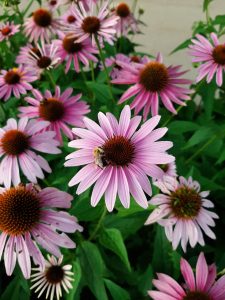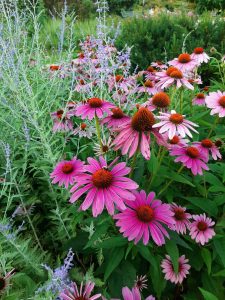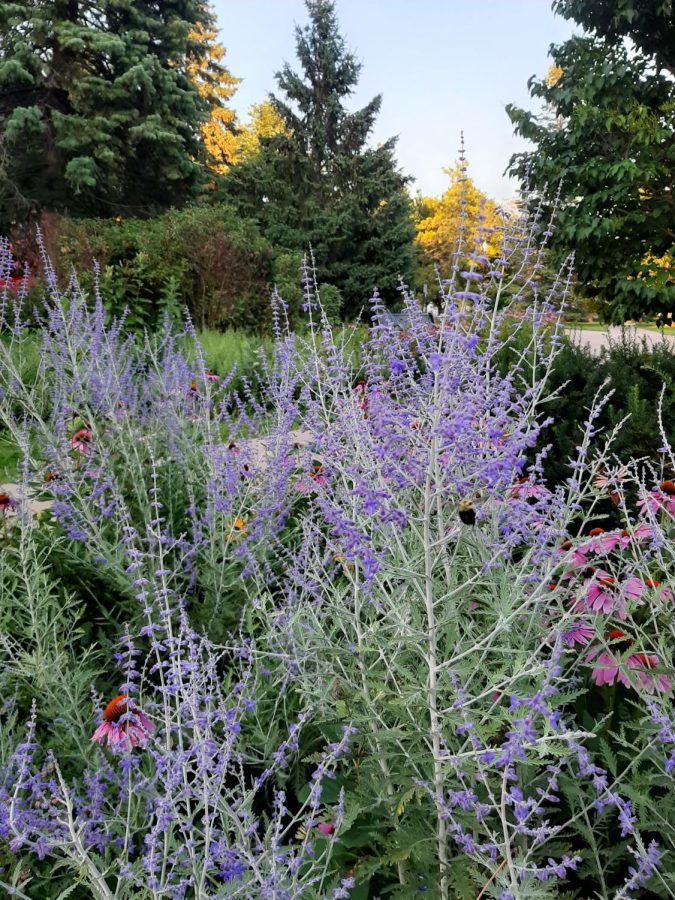Oshkosh campus features different plant life
May 3, 2023
Throughout the UW Oshkosh campus, there is a wide variety of plant life found on the campus grounds.
The variety of plants included comes from the Sustainability Institute, which helps upkeep these plants on campus.
Bradley Spanbauer, the sustainability director for the Sustainability Institute for Regional Transformations (SIRT), said the variety of plant life includes native and non-native plants.
“Plant life on campus ranges from regular, non-native turf grass, to a diversity of garden-variety plants in perennial beds, to native forbs and shrubs found in our bioswales and prairies,” he said. “[And] over 1600 trees on the Oshkosh campus alone.”
The upkeep of the plants looks different depending on the type of plant.
“Upkeep ranges from regular mowing during the summertime for turf grass, to weeding and invasive species removal in perennial beds, prairies and bioswales,” he said.
There is also a different upkeep for all the different trees found on and around campus.
 “We also have to maintain our trees with trimming during “R” months (months with the letter R in them),” Spanbauer said. “We also plant 10-20 trees per year as part of our Tree Campus Higher Education designation.”
“We also have to maintain our trees with trimming during “R” months (months with the letter R in them),” Spanbauer said. “We also plant 10-20 trees per year as part of our Tree Campus Higher Education designation.”
Spanbauer said some of the special plants on campus that require the upkeep include plants from surrounding areas in Wisconsin.
“One particularly interesting one is the Dwarf Lake iris,” he said. “Which is endemic to Wisconsin and is an endangered species, found in our spring ephemeral gardens which are found next to Halsey and Harrington (there is signage by them).”
The special plant life on campus is indicated by signage that includes a picture of the plant, the scientific name of the plant and a description of the plant.
Spanbauer said the importance of these plants on campus comes from their historical context and longevity in the area.
“They have been found here for thousands of years and have evolved along with animals, so the animals use them as habitat and forage sites,” he said.
Along with that, the plants also offer a lot to the ecosystem where they are planted.
“Plants offer oxygen while absorbing carbon dioxide,” Spanbauer said. “Many plants offer ecosystem services such as holding soils together to prevent erosion, filtering and cleaning rainwater after heavy rainstorms, and also are a source of natural beauty.”
As for the upkeep of these plants, the former grounds supervisor for the UWO campus grounds and current grounds supervisor for the Fond du Lac campus Lisa Mick, said it depends on the plant.
“The natural turf requires mowing, fertilization and weed treatment as management has determined,” she said. “In a more natural, holistic approach we would use compost and compost tea to provide the ‘food’ for the grass plants until we build up the soil so that it creates its own cycle of care.”
Some of the plant life requires more upkeep than others, such as what is known as the annual plantings.
“The edible and annual plantings are the most time-intensive next to the natural grass. They require yearly planting, synthetic fertilizer and hand weeding,” Mick said. “Although they are labor intensive, they are one of the areas most appreciated by the campus community.”
 The plant life is taken care of by the grounds crew on campus and is supported by volunteers and student employees, and is a lot to take care of.
The plant life is taken care of by the grounds crew on campus and is supported by volunteers and student employees, and is a lot to take care of.
“It’s a daunting task and sometimes overwhelming,” Mick said. “There is an ongoing battle between what people believe to be beautiful.”
With the constant upkeep, Mick said there is a possible solution to help ease the amount of work.
“I believe with the current climate (both literally and figuratively) we need to go with a more holistic and natural course in the care of this campus, this will mean that weeds exist,” she said.
Mick ended by making the point that when considering plant life, there is more than just the campus population that is on campus.
“On a small scale we are stewards of this campus and all that visit; not only the humans, but the bugs, birds and other wildlife,” she said. “We can’t let them down.”














